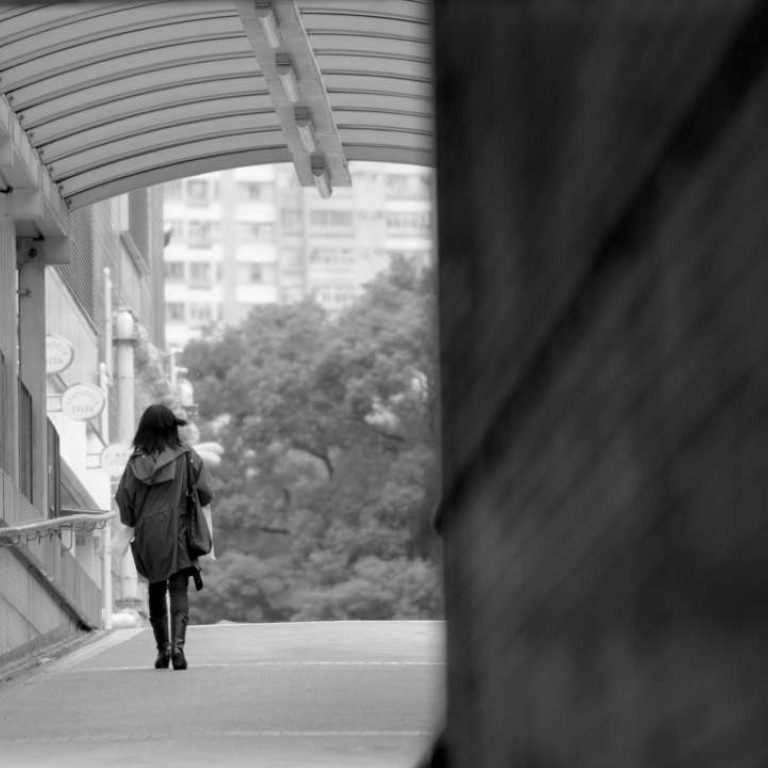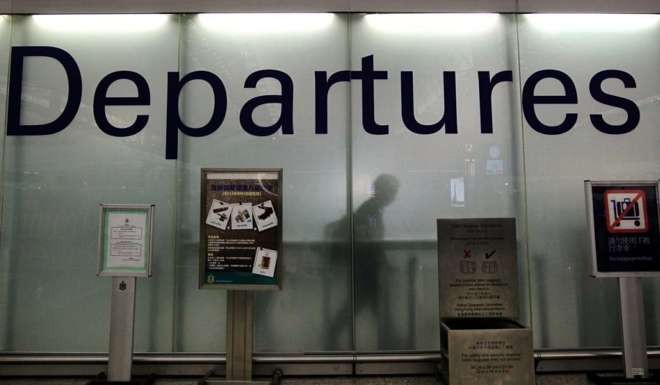
No reason to stay, no way to go for many of Hong Kong’s disillusioned young people
After studies showed many young people want to leave the city owing to politics and a lack of social mobility, experts say there is light at the end of the tunnel, as long as the government rights some major wrongs
Recent studies showing an alarming 40 per cent of people want to leave the city have renewed the debate on what makes Hong Kong an increasingly frustrating city to live in.
In particular, young people aged 18 to 30 were most unhappy with life, according to studies released last month by both Chinese University of Hong Kong and policy think tank Civic Exchange.
The findings are unnerving as young people are the city’s future, providing a key impetus for its dynamics.
Critics have pointed to the enormous sense of despair that engulfs Hong Kong as the key reason for people’s frustrations, which they believe have more to do with the city’s politics than its social and economic aspects.
To make matters worse, the harsh reality that only well-off families are able to put away some savings just adds to their woes and makes their dream of starting a new life elsewhere all the more unattainable.
A recent study by the Legislative Council on the financial challenges faced by Hong Kong households showed families earning below HK$35,500 a month would not be able to save with the city’s housing affordability the lowest among 367 leading cities in a global study.

Without hope for both the city’s outlook and their own sake, people’s desire of escaping the place is unstoppable, whether they can leave or not.
Failing to see any light at the end of the tunnel, some who cannot leave may resort to radical means, such as advocating for Hong Kong’s independence to vent their frustrations.
The key questions are: will Hong Kong be a stagnant place with no future? And how should we buck this worrying trend and raise hope in our youngsters?
Despite the doom and gloom, critics are confident that there is still a glimmer of hope, as long as the future government can rectify some bad policies and put effective governance back on track.
For Andrew Fung Ho-keung, director and CEO of the Hong Kong Policy Research Institute, the most important thing for the city’s next leader is to restore people’s faith by striking a better balance in the “one country, two systems” policy.
The way out for Hong Kong, he believes, is to reactivate the political reform whereby people may feel hope and opportunities for Hong Kong.
Fung said all eyes are now on the upcoming chief executive election as people still look for hope from the next leader.
“Their desperation hasn’t reached a point of no return. They still expect our next leader to fight for the best interests for Hong Kong with strong and shrewd leadership,” he said.
Fung believes the sense of despair originates from an increasing lack of faith in the concept of “one country, two systems” that forms the basis of the city’s governance.
His views echoed Chinese University poll findings that showed dissatisfaction with the current governance.

“In view of the current radicalised politics and squabbles at the Legislative Council, people generally feel unhappy living in Hong Kong,” Fung said.
“In particular there has been a lot of meddling from Beijing over the city’s affairs like the latest interpretation of the Basic Law. People naturally have a strong sense of hopelessness about Hong Kong’s future.”
For young people who are more sensitive and don’t have sufficient resources to improve themselves, they feel all the more frustrated living in the city.
Fung said it explained the growing trend of Hongkongers emigrating to Taiwan because the required personal capital threshold is lower compared to other places with a relatively low cost of living, and it has higher democracy and freedom levels than those in Hong Kong.
The Chinese University study also showed Taiwan was the preferred destination, with 16.3 per cent of respondents picking the island. Australia and Canada came in second and third place.
According to the Security Bureau, about 7,000 people emigrated last year, down from 9,800 in 2005. However, 891 moved to Taiwan last year, up 28 per cent from 2014, according to its immigration agency figures.
Also, the government’s heavy-handed approach in suppressing the pan-democrats – especially the pro-independence localists – and the stalled political reform have fanned the flames of conflict and despair, Fung said.
“After all, non-establishment lawmakers were elected by 60 per cent of those who cast their ballots. Treating them as public enemies is disrespecting the public mandate. How can people feel happy when the government is ignoring their opinion?” he asked.

“Advocating for independence is not right, but the government should handle this issue more delicately.”
The stalled political reform last year also added fuel to Hongkongers’ frustrations as they were denied any say over the election of the chief executive, he added.
Shih Wing-ching, founder of property agency Centaline agrees, believing people’s dissatisfaction is more to do with Beijing’s meddling policies than anything else.
“Through expressing their wish to quit Hong Kong, people in fact made a political statement against Beijing’s policies on Hong Kong,” he said.
Still, the Civic Exchange study showed one-third of respondents were most concerned about housing over other policies, of whom more than half said tackling property prices was the most pressing housing issue.
The housing conditions, Shih said, had gradually improved with the average living space per person in public housing standing at 13.1 square metres this year from 12 square metres 10 years ago as the government continued to increase housing supply.
But these improvements had failed to cater to the rising demand for more personal space.
Youngspiration’s Yau Wai-ching, one lawmaker at the centre of the oath-taking controversy, said young people could not even afford a proper place in which to have sex, let alone buy their own home.
To make matters worse, people face soaring property prices and long waits for public housing.
“Unfortunately nowadays the wage increases fail to catch up with the growth of property prices.
They don’t see a stable career path or opportunities for climbing the social ladder
People therefore are pessimistic about climbing up the housing ladder,” Shih said.
Normally property prices undergo a market cycle, however, he pointed out that the upward cycle had lingered for too long fuelled by the growing demand of mainland customers who propped up prices by snapping up luxury flats.
To address those who want their own homes, he suggested the government allocate housing supply exclusively for first-time Hong Kong buyers.
From a social point of view, Professor Paul Yip Siu-fai, of the department of social work and social administration at the University of Hong Kong, said many youngsters were unhappy because they felt they were being neglected by the government and saw no way out of the situation.
“They don’t think they are part of the engagement process for any policy formulation,” he said. “They can’t see their voices being reflected or listened to by the government.”
Yip blamed the government’s uneven distribution of resources for the lack of opportunities for youngsters, citing the one-off grant scheme for NGOs, as these organisations have been struggling to raise funds to create more social enterprise and start-up programmes for young people.
“They don’t see a stable career path or opportunities for climbing the social ladder,” Yip said. “This is a form of social injustice.”
Leaving city is costly
“The future looks bad … and if there is no solution to the problem, why not leave?” asked Konvic Yiu Chu-kong.
Emigration is a topic that often pops up in conversations between Yiu, 26, and his friends. But taking the next step is often less straightforward.

He has spent his whole life in the city, but the idea of leaving occurred to the recent graduate when he began his education at university about five years ago and started to feel there were “poor and absurd” things happening in local politics.
He cited the controversy surrounding the use of taxpayers’ money to fund construction of the Guangzhou–Shenzhen–Hong Kong Express Rail Link and police handling of the so-called “umbrella revolution” in 2014, which saw officers use pepper spray, batons and tear gas against protesters.
He also pointed to the ongoing Legislative Council fiasco sparked by two recently ousted localist lawmakers insulting China in their oaths of office and referring to Hong Kong as a nation.
Housing is another reason the computer science graduate, who works as a marketing trainee, is considering a move. He pointed to research that says a university graduate could previously only afford one sq ft of a flat in Taikoo Shing, a coveted residential development in Quarry Bay, with one month’s salary, but now not even that is affordable, making the idea of purchasing a home almost impossible.
Yiu said he would consider moving to Japan, Taiwan or Australia, with Taiwan being the most feasible option.
“Taiwan has universal suffrage so you can vote for a leader that represents you,” he said.
Emigration remains just an idea however, with concerns about family holding him back.
He said emigrating to Taiwan would not be easy because his current job has not equipped him with particularly specialised skills, meaning job hunting overseas would be difficult. If he were to take the investment migration route it would take a long time to save up the money.
Consequently he is still undecided about whether he will eventually go for it.
If the next chief executive of the city makes Hong Kong better and the political situation improves, he might be less inclined towards migrating, he said.
Enough is enough
Leaving the city for good never occurred to 28-year-old Hongkonger Lau Ming-hei and his wife until a couple of years ago.
Shortly after getting married in 2014, the couple endured the Occupy experience.
Lau said the civil disobedience movement prompted them to seriously consider emigrating.

Among some of the main push factors was the lack of democracy, he said. “The Hong Kong government is easily controlled by China and the direction Hong Kong takes is contingent on what China wants; Hongkongers do not have a chance [to make decisions on many important matters].”
Lau believes the city’s “relatively poor” human rights record worsened during the Occupy movement.
High housing prices are also driving the young couple away. Currently renting a flat in Lam Tin, Lau said the size – about 400 sq ft – was not ideal, but they had to make do as it already took up about a quarter to a fifth of their household income.
They did not dare dream about buying a flat as it was too pricey, while public housing was also out as their income exceeded the limit.
The decision to move was not only for themselves, but for their two-month-old son and six-year-old poodle.
Lau said the effects of academic pressure in Hong Kong were another factor. The guitar and drums teacher was critical about the lack of diversity in development, such as in arts and culture and animal welfare, in Hong Kong.
“When constructing the Hong Kong – Zhuhai – Macau Bridge, the government did not care about the survival of Chinese white dolphins, an endangered species,” Lau, who is also an animal rights activist, said.
Lau believes they have a good chance of emigrating, with his wife working as a nurse.
After doing some research, they decided that Australia would be the right fit, as nurses are in high demand. Moreover, they believe the education system is less stressful Down Under and there is more democracy, diversity in development and better protection for both humans and animals.
“A lot of my friends have discussed the possibility of moving, but not everyone has the ability… For my family, as long as we could move, we would move,” he said.

